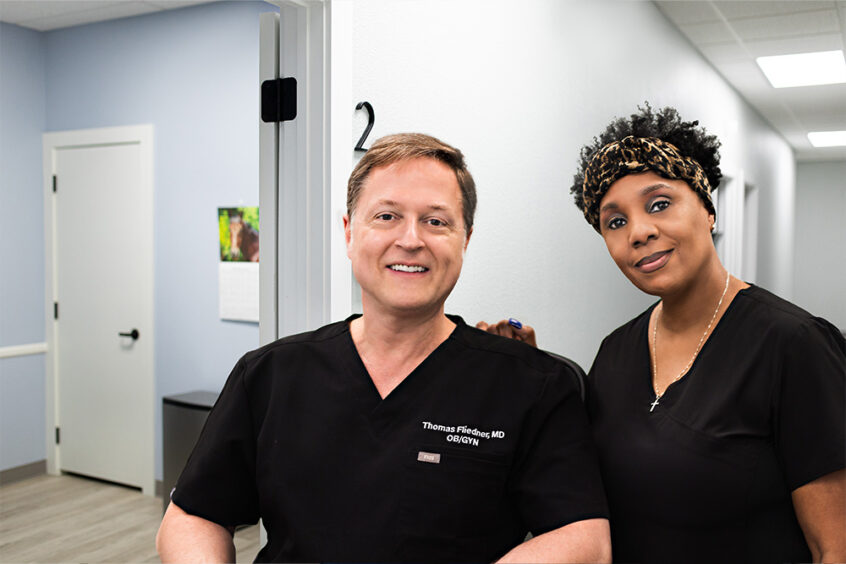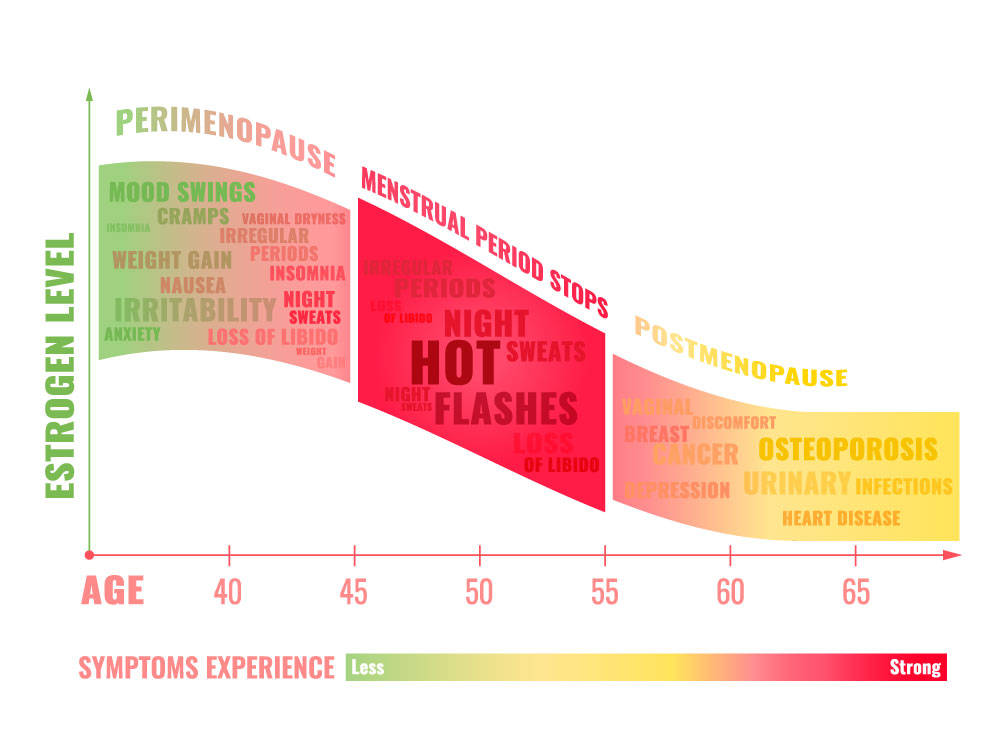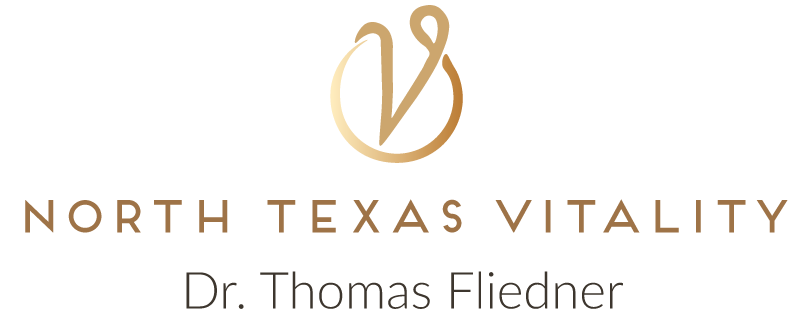Navigating Menopause: Understanding the Stages, Signs, and Treatment Options

Our goal at North Texas Vitality is to come alongside our patients and guide them through health issues and physical transitions such as menopause. It is with this intention that we bring you Dr. Fliedner’s comprehensive guide on navigating menopause.
Menopause is a natural phase in a woman’s life, but it often arrives with various challenges and changes both physically and emotionally. We believe the more women understand the different stages, signs, and treatment options, the better they will make healthy decisions to manage their transition with ease and grace.
In this article, we will take you through the three stages of menopause: perimenopause, menopause, and postmenopause. We will delve into the signs and symptoms that women may experience during each stage, providing valuable insights into what to expect and how to cope with the associated discomfort.
Additionally, we will explore the wide range of treatment options available to alleviate these symptoms, including hormonal and non-hormonal approaches. We will discuss the benefits of each method, empowering you to make an informed decision that best suits your individual needs and preferences.
Whether you’re tip-toeing into menopause or already experiencing its effects, this article will serve as your trusted resource to navigate this significant life transition. So, join us as we embark on this journey to gain a deeper understanding of menopause and empower ourselves with the necessary knowledge to embrace this new chapter in life.
Stages of Menopause

Fortunately, menopause is not a sudden event that sneaks up behind you and startles you. Rather it is a slow process that occurs over several years and gives you time to prepare for it and manage it according to your personal preferences. Dr. Fliedner tells his patients that it is helpful to divide this journey into three stages: perimenopause, menopause, and postmenopause.
PERIMENOPAUSE
This is the phase leading up to menopause and can begin as early as a woman’s late 30s or early 40s. During this stage, the ovaries gradually produce less estrogen, causing irregular menstrual bleeding and a range of symptoms such as hot flashes, mood swings, and sleep disturbances.
MENOPAUSE
Menopause marks the end of a woman’s reproductive years. The medical community diagnoses a woman in menopause when she has gone 12 consecutive months without a menstrual period. At this stage, the ovaries no longer release eggs, and hormone levels have fallen. Common symptoms include vaginal dryness, night sweats, and reduced libido.
POSTMENOPAUSE
Postmenopause refers to the years after menopause. During this stage, a woman’s menopausal symptoms may continue, and her body gradually adjusts to lower hormone levels. During this time, it is critical for a woman to see a hormone specialist, if she is not already, to evaluate her overall health and manage any health concerns caused from low hormones and hormonal imbalances. Diseases that we often associate with age are often the result of hormonal imbalances, and a hormone specialist can treat those imbalances and counteract degenerative diseases.
Signs and symptoms of menopause
Menopause affects every woman differently, and the signs and symptoms can vary in intensity and duration. However, some common experiences include:
Hot flashes and night sweats: These are sudden feelings of heat, often accompanied by excessive sweating and can disrupt sleep and daily activities -not to mention embarrassment.
Mood swings and irritability: Fluctuating hormone levels can cause emotional ups and downs, leading to feelings of irritability, anxiety, and depression.
Sleep disturbances: Many women experience difficulty falling asleep or staying asleep during menopause, leading to fatigue and daytime sleepiness.
Vaginal dryness and discomfort: Reduced estrogen levels can cause vaginal dryness, itching, and discomfort during intercourse.
Changes in sexual desire: Menopause can affect a woman’s libido, leading to a decrease in sexual desire or changes in sexual satisfaction.
Weight gain and changes in body composition: This is probably the most upsetting for women. Hormonal imbalances can contribute to weight gain, particularly around the tummy and change a woman’s natural body shape.
Physical changes during menopause
Apart from the common symptoms mentioned above, menopause also brings about various physical changes. These changes can vary from woman to woman but may include:
Bone density loss: Estrogen plays a crucial role in maintaining bone density. As estrogen levels decrease during menopause, the risk of osteoporosis and fractures increases.
Changes in skin and hair: Reduced estrogen levels can lead to dry skin, thinning hair, and increased hair loss.
Breast changes: Menopause can cause breast tissue to become less dense, and some women may experience breast tenderness or changes in breast size and shape.
Heart health: Estrogen has a protective effect on the cardiovascular system, so its decline during menopause can increase the risk of heart disease and other cardiovascular conditions.
Urinary changes: Menopause can contribute to urinary incontinence or an increased frequency of urination due to changes in the urinary tract and pelvic floor muscles.
Emotional and psychological effects of menopause
Menopause is not just a physical transition; it also triggers significant emotional and psychological effects on women. Hormonal changes and imbalances during menopause can lead to mood swings, irritability, and feelings of anxiety or depression. Many women also experience a loss of identity or a sense of loss associated with the end of their reproductive years.
The concept of raging hormones is real when they are left to themselves without the help of a hormone specialist to bring them into balance.
If you feel like what we are describing is you, we encourage you to seek support. You may want to start by talking with girlfriends, or family members about what you are feeling. We recommend engaging in stress-reducing activities such as yoga, meditation, or regular exercise – these can help manage emotional well-being. Make an appointment with a hormone specialist to learn your hormone levels and discuss bioidentical hormone treatments.
Managing menopause symptoms naturally
Dr. Fliedner recommends all women, whether on BHRT or not, should promote their overall well-being by following some of the natural approaches we recommend below.
Healthy lifestyle habits: Eating a balanced diet rich in fruits, vegetables, whole grains, and lean proteins can support hormonal balance and alleviate menopause symptoms. Regular exercise, stress management techniques, and adequate sleep are also crucial for maintaining optimal health during this transition.
Herbal remedies: Certain plants and herbs, such as black cohosh, red clover, and evening primrose oil, have been used traditionally to alleviate menopause symptoms. However, it is essential to consult with a healthcare professional before incorporating these remedies into your routine. Herbs can have powerful effects on your system and should be managed by your doctor.
Mind-body practices: Practices like yoga, tai chi, and meditation can help reduce stress, improve sleep quality, and alleviate menopause symptoms. These activities promote relaxation, mindfulness, and overall well-being.
Supplements: Some women find relief from menopause symptoms by taking specific supplements such as vitamin D, calcium, and omega-3 fatty acids. Just as with herbs, we recommend you consult with your doctor before starting any new supplements.
Bioidentical hormone replacement therapy
Bioidentical hormone replacement therapy (BHRT) involves taking bioidentical hormones to replace the hormones that the body no longer produces. These hormones are made in a lab from a plant steroid called diosgenin, found in soy and wild yams, and their molecular structure is identical to the hormones naturally produced by the human body.
Dr. Fliedner prescribes compounded bioidentical hormones because they allow him to prescribe the specific hormones and amounts to meet the specific needs of his patient, whereas commercially available bioidentical hormone products are only available in standard dosages and forms.
“Compounded bioidentical hormones allow a doctor to more effectively treat and dose his patients as the compounding pharmacist can adjust the dosage and formulation to suit an individual patient’s requirements,” says Fliedner.
Here’s what BHRT did for Marie:
“I’ve had to fight with several doctors about getting HRT now that I’m in menopause and they all seemed to think it was unnecessary despite how miserable I am. I should note that I have a couple of chronic health issues that also make me feel terrible, so the last thing I need is one more thing to add to the joint pain, brain fog and insomnia. Dr. Fliedner listened and understood me. Normally I prefer female GYNs, but Dr Fliedner is lovely and does right by his patients.” Marie C.
Alternative treatments for menopause symptoms
For women who prefer non-hormonal approaches, Dr. Fliedner recommends several alternative treatments that often help to alleviate menopause symptoms:
Cognitive-behavioral therapy (CBT): CBT is a type of talk therapy that focuses on challenging and changing negative thoughts and behaviors. It can help women cope with the emotional and psychological aspects of menopause, such as anxiety, depression, and sleep disturbances.
Acupuncture: This ancient Chinese practice involves inserting thin needles into specific points on the body. Some studies suggest that acupuncture may help reduce hot flashes and improve sleep quality in menopausal women.
Supplements: Dr. Fliedner prescribes practitioner-grade supplements to both his men and women patients to incorporate into their dietary routine to support naturally healthy organs.
Vaginal estrogen: For women experiencing vaginal dryness and discomfort, low-dose vaginal estrogen in the form of creams, tablets, or rings can provide relief without the systemic effects of oral hormone therapy.
Lifestyle changes to support menopause transition
In addition to medical treatments and alternative therapies, certain lifestyle changes can support a smoother menopause transition. Dr. Fliedner recommends everyone incorporate these healthy habits into their lifestyle.
Regular exercise: Engaging in physical activity, such as walking, swimming, or yoga, can help reduce menopause symptoms, improve mood, maintain bone density, and manage weight.
Healthy diet: A balanced diet rich in fruits, vegetables, whole grains, lean proteins, and healthy fats can provide essential nutrients and support hormonal balance during menopause.
Stress management: Practicing stress-reducing techniques, such as deep breathing exercises, meditation, or mindfulness, can help alleviate menopause symptoms and improve overall well-being.
Adequate sleep: Creating a sleep-friendly environment, establishing a bedtime routine, and practicing good sleep hygiene can help manage sleep disturbances during menopause.
Social support: Seeking support from friends, family, or support groups can provide understanding, encouragement, and companionship during this significant life transition.
Menopause is a natural and inevitable phase of life
It’s important to remember that the changes occurring to you have been happening to women down through the ages. Women share this common experience, and knowing that so many others have gone before you on this well-trodden path can help bring peace.
We hope this guide helps you recognize the signs and symptoms in your own body and encourages you to seek out appropriate support and treatment. Whether opting for natural remedies, exploring bioidentical hormone replacement therapy, or considering alternative treatments, women have so many wonderful options to manage their menopause symptoms.
Dr. Fliedner recommends his patients make self-care their first priority. He says, “by engaging in stress-reducing activities, and seeking social connections, women can embrace menopause as a transformative journey towards a new chapter of life.”
You are not alone in this journey
If you’d like to know more about Dr. Fliedner and his staff and how they can support you through menopause, schedule an appointment by submitting the form below or calling our office at 469-455-1665.
